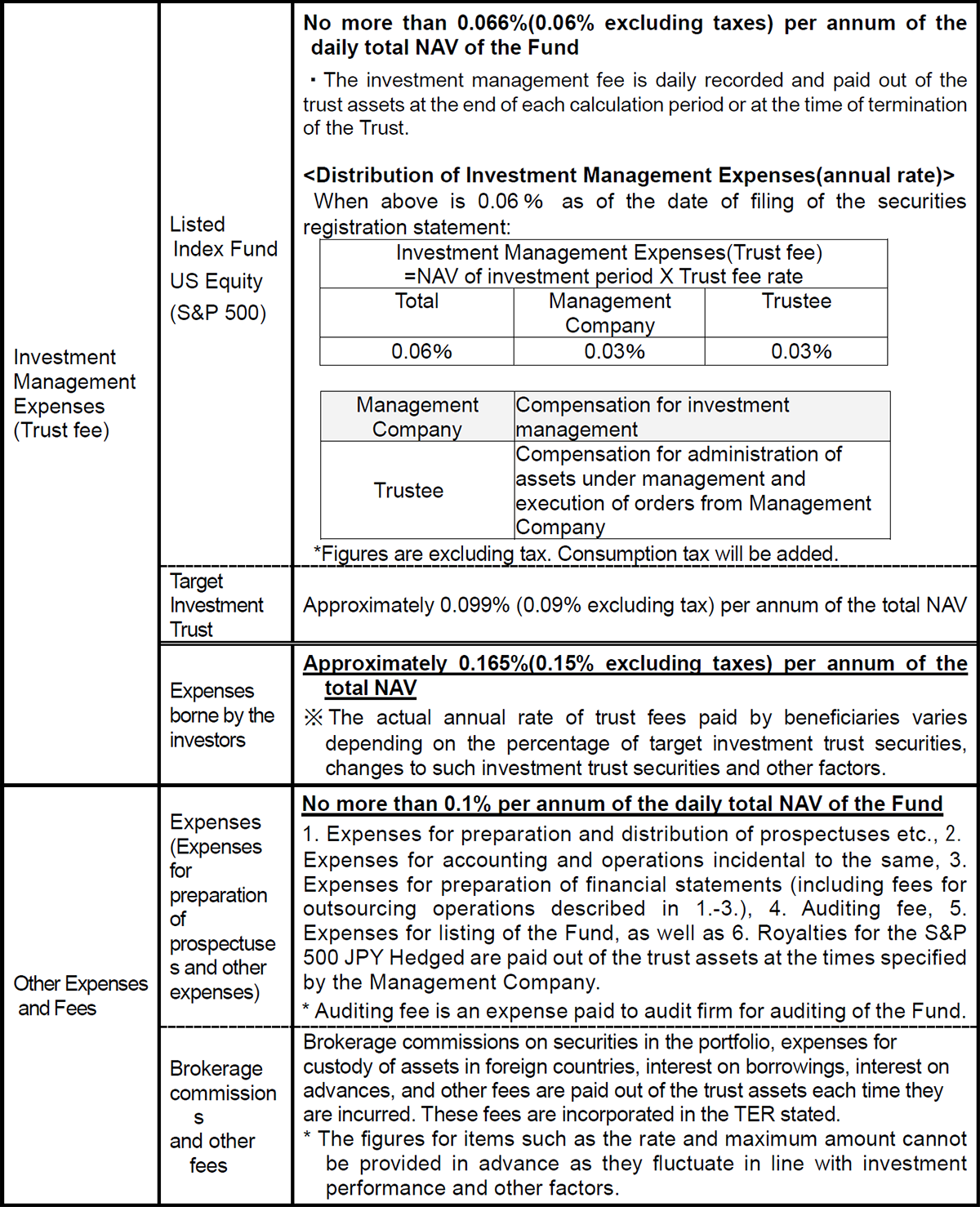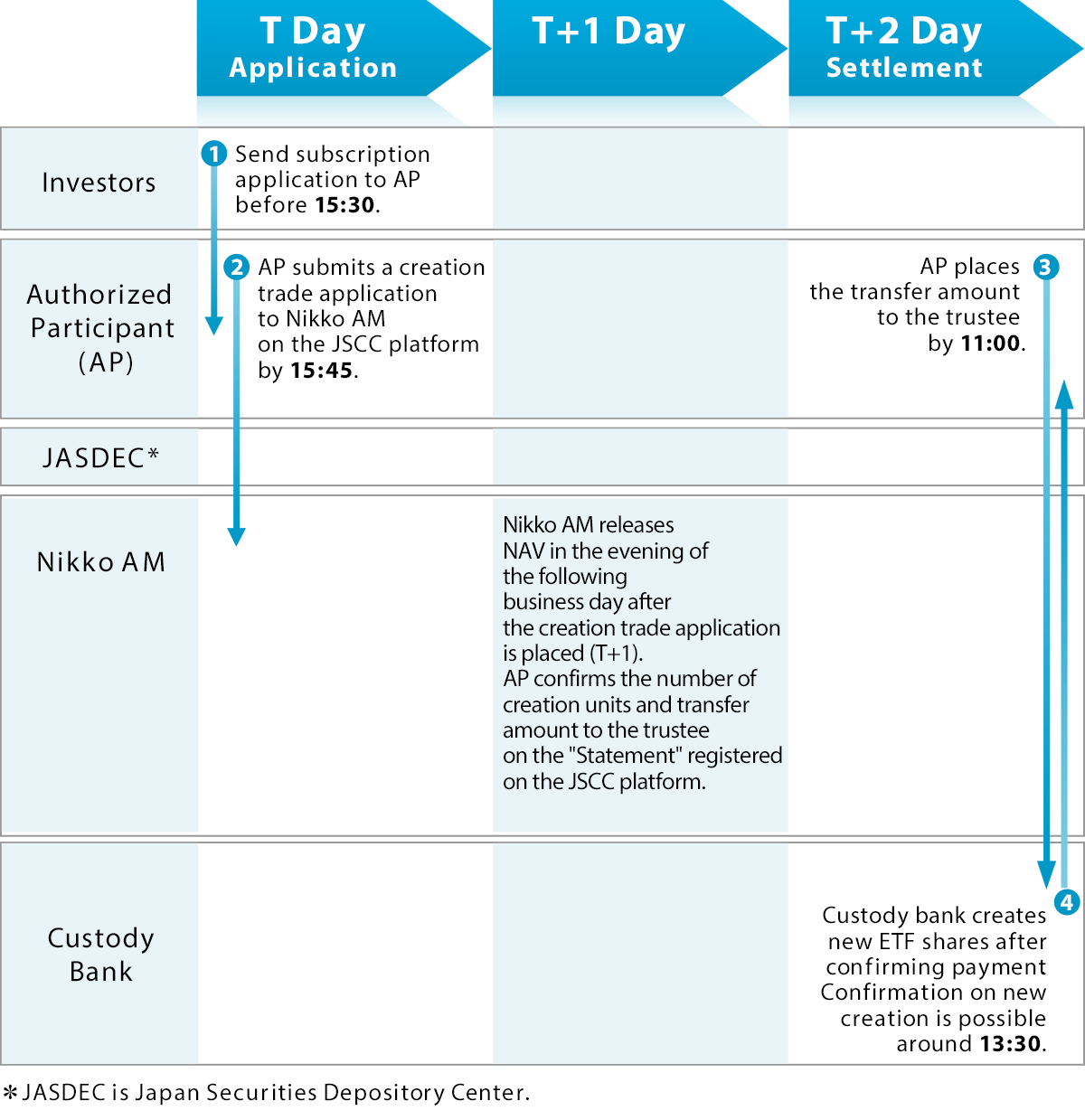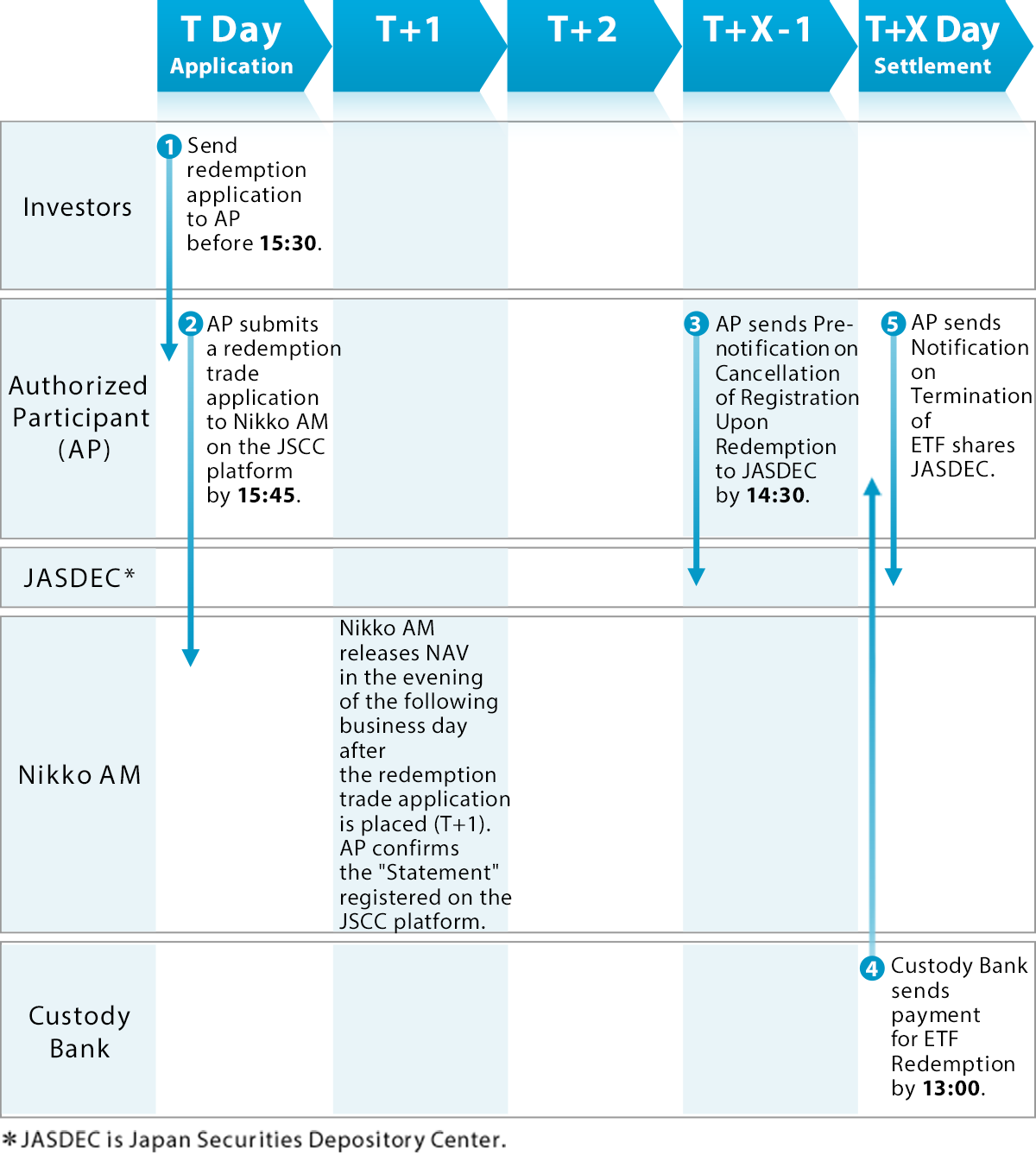On September 1, 2025, Nikko Asset Management Co., Ltd. will change its name to Amova Asset Management Co., Ltd.
This Fund seeks the net asset value per unit to track the performance of the yen-converted S&P 500 JPY Hedged by mainly investing in the separately specified investment trust securities.
Key information
| Name: | Listed Index Fund US Equity (S&P500) Currency Hedge | |
| Code: | 2521 |
Net Asset Value and Performance
Structure of the Fund
This Fund of Funds invests on the securities held for investment trust.
- Index Fund US Equity Currency Hedge (for Institutional Investors)
The Fund will invest mainly in "Nikko US Equity Index Mother Fund" and seeks to see its performance to correlate with the movement of the yen-converted S&P 500 JPY Hedged. - Money Account Mother Fund
The Fund aims to ensure stable returns by investing in public and corporate bonds.

| Fund Name | Listed Index Fund US Equity (S&P500) Currency Hedge Open-end/Overseas/Equities/ETF/Index type |
| Listed Exchange | Tokyo Stock Exchange |
| Issue Code | 2521 |
| Targeted Investments | This fund invests in investment trust securities that aim to match fluctuation in the yen-converted S&P 500 JPY Hedged. |
| Date Listed | 3 August 2018 (launched on 31 July 2018) |
| Exchange Trading Unit | 1 unit |
| Trust period | Unlimited |
| Computation Period | From 21 January of each year to 20 January of the next year |
| Closing Date | January 20 of each year |
| Dividends | As a general rule, the full amount of dividends and other income arising from the trust assets is distributed after deduction of expenses. *There is no guarantee on the payment or the amount of dividend. |
Fund Expenses
■Expenses to be borne directly by investors
| Subscription Fee | Independently set by Distributors *Please contact your Distributor for further information. *Subscription Fee is compensation for explanation and information providing about the Fund or investment environment, and is also including expense of clerical processing of the subscription. |
| Exchange Fee | Independently set by Distributors *Please contact your Distributor for further information. *Exchange Fee is compensation for clerical processing of the exchange. |
| Amount to be Retained in Trust Assets | None. |
■Costs paid indirectly by the customer for the trust assets (paid from the fund)
| TER (Total Expense Ratio) |
0.24% (TER includes Trust Fee, management fee and other costs below) Please refer to the prospectus for details. |

The total amount of expenses of the Fund to be borne by investors varies according to holding length and investment status, and thus cannot be shown.
Major Investment Restrictions
|
Trustee Companies
|
The S&P 500 Index is a float-adjusted, market capitalization-weighted index which is composed of 500 stocks selected among companies listed on U.S. financial instruments exchanges in view of their market capitalization, liquidity, and industry balance.
The S&P 500 Index is calculated by S&P Dow Jones Indices LLC and the component stocks are reviewed and replaced on a regular basis.
The S&P 500 JPY Hedged is the result of the JPY currency hedging of the USD- denominated S&P 500 Index by Nikko Asset Management Co., Ltd.

Further Information
Japan Exchange Group (JPX)
Japan Exchange Group publishes summaries and lists of the ETFs, as well as other valuable information on their website.
S&P Global
- Listed ETF iNav
Please click this link to see the iNAV.
Standard & Poor's
- S&P 500 Index
- Fact Sheet, Methodology, Directory (In the left menu)
*Link to external sites.
Copyright and Other Rights of the “S&P 500® Index”
"Standard & Poor's®", "S&P®", "Standard & Poor's" are registered trademarks owned by Standard & Poor's Financial LLC and Nikko Asset Management uses these trademarks under the license. Standard & Poor's does not support, recommend, distribute, or promote Listed Index Fund US Equity (S&P500) Currency Hedge (hereinafter "The Fund") and makes no expression, guarantee, or condition on the suitability of investment in this Fund.
The Fund is not supported, guaranteed, distributed, or promoted by S&P and its affiliated companies (hereinafter "S&P"). S&P makes no representation, condition, or warranty, express or implied, to the owners of the Fund or any member of the public regarding the advisability of investing in securities generally or in the Fund particularly or the ability of the S&P 500 Index to track general stock market performance. The relationship of S&P and Nikko Asset Management is only in respect of the licensing of registered trademarks of S&P and S&P 500 Index. S&P does not take the needs of Nikko Asset Management or the owners of the Fund into consideration in determining, composing or calculating S&P 500 Index. S&P is not responsible for or has participated in the determination of the timing of, prices at, or amount of the Fund to be issued or in the determination or calculation of the equation by which the Fund is to be converted into cash. S&P assumes no obligation regarding, nor does it take any responsibility for management, marketing, or trading of this Fund whatsoever.
S&P does not make any guarantee of the accuracy or completeness of the calculation or basic data of the S&P 500 Index. S&P takes no responsibility for any error, lack, or fault included in the S&P 500 Index. S&P makes no explicit or implicit guarantee whatsoever of the results arising from use of the S&P 500 Index or data incorporated therein on Nikko Asset Management Co., Ltd., owners of the Fund, or any other persons or organizations. S&P does not make any guarantee, explicit or implicit, of merchantability or suitability of the S&P 500 Index or the data contained therein. Without limiting any of the foregoing, S&P expressly disclaim any special, punitive, indirect, or consequential damages (including lost profits), even if notified of the possibility of such damages.
- 5 Mar 2025 — Earnings Report for Fiscal Year ended Jan 2025
- 2 Sep 2024 — Interim Earnings Report for Fiscal Year ending Jan 2025
- 4 Mar 2024 — Earnings Report for Fiscal Year ended Jan 2024
- 1 Sep 2023 — Interim Earnings Report for Fiscal Year ending Jan 2024
- 3 Mar 2023 — Earnings Report for Fiscal Year ended Jan 2023
- 2 Sep 2022 — Interim Earnings Report for Fiscal Year ending Jan 2023
- 4 Mar 2022 — Earnings Report for Fiscal Year ended Jan 2022
- 2 Sep 2021 — Interim Earnings Report for Fiscal Year ending Jan 2022
- 5 Mar 2021 — Earnings Report for Fiscal Year ended Jan 2021
- 2 Sep 2020 — Interim Earnings Report for Fiscal Year ending Jan 2021 (21 Jan 2020 - 20 Jul 2020)
- 4 Mar 2020 — Earnings Report for Fiscal Year ended Jan 2020 (21 Jan 2019 - 20 Jan 2020)
- 2 Sep 2019 — Interim Earnings Report for Fiscal Year ending Jan 2020 (21 Jan 2019 - 20 Jul 2019)
- 5 Mar 2019 — Earnings Report for Fiscal Year ended Jan 2019 (31 Jul 2018 - 20 Jan 2019)
This Fund can be applied for as a cash creation and a cash redemption at Authorised Participants in addition to the Tokyo Stock Exchange. When applying as a direct addition and exchange, please keep in mind that we cannot accept your application on the following dates:
Authorized Participants
- SMBC Nikko Securities Inc.
- ABN AMRO Clearing Tokyo Co., Ltd.
- Barclays Securities Japan Limited
- BNP Paribas Securities (Japan) Limited
- BofA Securities Japan Co., Ltd.
- Daiwa Securities Co. Ltd.
- Goldman Sachs Japan Co.,Ltd.
- JPMorgan Securities Japan Co., Ltd.
- Mitsubishi UFJ Morgan Stanley Securities Co., Ltd.
- Mizuho Securities Co., Ltd.
- Nomura Securities Co.,Ltd.
- Societe Generale Securities Japan Limited
Daily Creation and redemption are based on ETF's NAV calculated in early evening. Confirm non-tradable days by referring to trading calendar on our official homepage. Basket for creation is continually-updated on our official homepage.
Basically sell/buy at last price of T day's market while FX rate is TTM of one business day after the application (10am on T+1)
The flow chart below is showing the creation/redemption process for Nikko AM ETFs. Please note that transactions cannot be processed for days on which applications are not accepted.
Creation Flow for Cash Creation/Redemption Type ETFs

Redemption Flow for cash Creation/Redemption Type ETFs

Investors are not guaranteed the investment principal that they commit. Investors may incur a loss and the value of their investment principal may fall below par as the result of a decline in market price or NAV. All profits and losses arising from investments in the Fund belong to the investors (beneficiaries). This fund is different from saving deposit.
The Fund invests primarily in stocks. The NAV of the Fund may fall and investors may suffer a loss due to a decline in stock prices or deterioration in the financial conditions and business performance of an equity issuer. Losses may also be incurred due to exchange rate fluctuation when investing in assets denominated in foreign currencies.
Major risks of the investment trust securities targeted for investment are as follows:
1. Price Fluctuation Risk
Stock prices fluctuate due to the changes in the information of the company's growth and profitability, and any changes in such information. They also fluctuate as they are affected by economic and political conditions in Japan and abroad. There is a risk that the Fund may incur material losses if unexpected changes occur in stock price movements or liquidity.
Public and corporate bonds contain a risk of price fluctuation due to interest rate fluctuation. In general, when interest rates rise, bond prices decline, resulting in a decline in the fund's NAV. However, the range of price fluctuation varies by bond depending on duration and issuance conditions of coupon rate and others.
2. Liquidity Risk
There is a risk that the Fund will incur unexpected losses when the market size or trading volumes is small. The purchase and sale prices of securities are influenced by the trading volume, resulting in the inability of the Fund to sell certain stocks in its portfolio at prices that are expected to be realized in light of the prevailing market trend, that a security can sold as appraised, or that the transaction volume is limited regardless of the price levels.
3. Credit Risk
There is a risk that the Fund will incur material losses in the event of a serious crisis that directly or indirectly affects the business of a corporation in which the Fund invests. The prices of stocks of issuers may substantially decline (possibly to zero) due to fears of default or corporate bankruptcy, which can contribute to decline in the Fund's NAV.
In cases where default has occurred or is expected to occur, for issuers of public and corporate bonds or money market instruments, the prices of such corporate bonds or money market instruments decline (the value could even fall to zero). This results in a decline in the Fund's NAV. Also, if default in fact occurs, there is a high possibility of being unable to collect investment funds.
4. Currency Fluctuation Risk
For foreign currency-denominated assets, in principle, currency hedging is carried out in order to reduce currency fluctuation risk. However, currency fluctuation risk cannot be eliminated completely. When currency hedging is carried out, if the yen interest rate is lower than the interest rate of the currency for which hedging is carried out, a hedge cost equivalent to the difference in interest rates is incurred. Hedge costs for currency hedging may be higher than anticipated depending on currency and interest rate trends.
Major discrepancy factors for yen-converted S&P500 JPY Hedged and NAV
Whereas the Fund seeks to match the NAV volatility with that of the yen-converted S&P 500 JPY Hedged, it does not guarantee movements that are identical to those of the Index for the following reasons:
- The lag in the timing from fund inflow to the purchase of investment trust certificates.
- The potential investment in selected issues other than S&P 500 JPY Hedged, potential market impact from the trading, etc., of individual issues or expenses from trust fees when portfolio adjustments are made due to changes in selected issues on the S&P 500 JPY Hedged or capital transfers, costs borne by the Fund such as brokerage commission, audit costs, etc.
- The management fee from securities or dividends loan of incorporated issues.
- When derivative transactions such as futures are made, there may be disparity between the price movements of all or some of such transactions and that of the S&P 500 JPY Hedged.
Discrepancy between the market prices at which stocks are traded on financial instruments exchanges and the NAV
The Fund is listed on the Tokyo Stock Exchange and the units are traded on that exchange. The market price of the units is affected primarily by the demand for the Fund, its performance, and how attractive it is to investors in comparison with their other investments. It is not possible to predict whether the units will sell in the market above or below the NAV.
*Since the prices of the investment trust securities targeted by the Fund fluctuate due to the impact of these factors, the Fund itself is subject to the same risks.
*The factors that contribute to fluctuations in the NAV are not limited to those listed above.
Additional Considerations
- This document is meant as promotional material whose purpose is for Nikko Asset Management to provide information about its "Listed Index Fund US Equity (S&P500) Currency Hedge" and for investors to gain further understanding about the fund.
- The provisions stipulated in Article 37-6 of the Financial Instruments and Exchange Act (the “cooling-off period”) are not applicable to Fund transactions.
- This Fund differs from deposits or insurance policies in that it is not protected by the Deposit Insurance Corporation of Japan or the Policyholders Protection Corporation of Japan. Nor are investment trusts protected by investor protection funds when purchased at banks or other registered financial institutions.
- When the Fund faces big redemption causing short term cash requirement or sudden change in the main trading market condition, there can be temporal decline in the liquidity of holding assets, resulting in the risks that Fund unable to trade securities at the expected market prices or appraised prices, or encounters limitation in trading volume. This may result in the negative influence on NAV, suspension of redemption applications, or delay in making payment of redemption.
- When applying to invest in the Fund, please make the decision to invest carefully after taking the time to read the delivered pre-agreement document and other relevant materials in detail.


